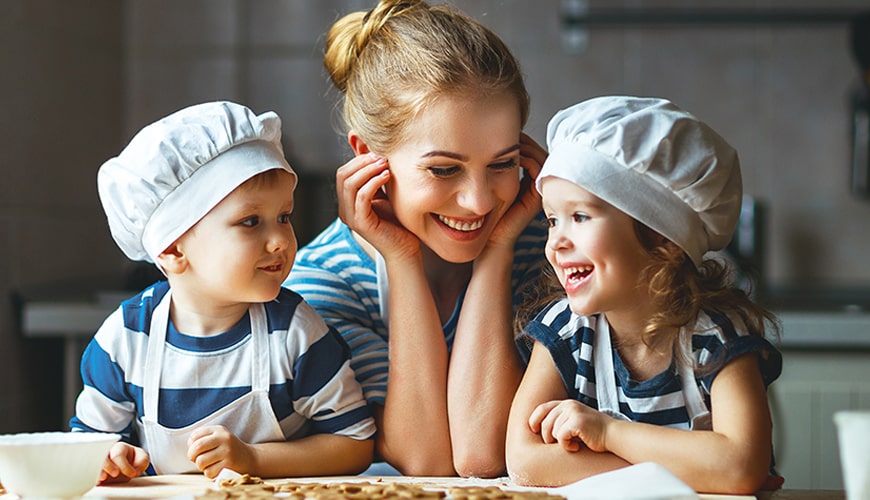The food we prepare for them, the kitchen tools we use and the vegetables we use, creates amazing perspectives in their creative and developing minds. While watching us cook allows us to realize a lot of things and learn about them at a very young age. When they are a little bit older, their efforts to make food out of play dough or their behaviour of offer tea in toy cups, are all parts of the activities they observed in the kitchen.
In kitchen where they observe all of that, helping you cook is a great opportunity for them to be included in the cooking process and learn new things. We listed the benefits of spending time with the children in the kitchen.

Physical and Mental Development
The activities the children conduct with you in the kitchen, are quite efficient for the development of their fine motor skills and hand skills. Children whose hand skills develop alongside the practices they are doing, also have their fine motor skills develop in the kitchen most of the time. Mixing the egg and the milk which you placed in a bowl, mixing the cake mix you prepared, getting a spoonful of spice from the spice jars and adding them, separating sweat peas from each other or cutting dough and shaping them... Maybe these are easy for you but such activities significantly contribute to the development of fine motor skills of your children. Task them with little activities without any safety concerns and watch them try and develop their own skills. You will be suprise at how fast they learn things!
In addition to motor muscles, you can also contribute to the development of the hand-eye coordination of your children with kitchen activities. For example, sprinkling sesame on bagels is a simple activity, but it is very effective in developing such skills.

Kitchen can be considered as a math teacher for the development of the key features of mental development. Activities such as counting, measuring, developing problem solving skills, being organized, observing and estimating which create curiosity and ensure thinking and contribute to mental development, can be taught to children with simple kitchen activities in a fun way. Tasks such as breaking 4 eggs and adding 2 glasses of milk, will contribute to the mental development of your children as well as contributing to the their mathematical and scientific background. While your children grow up, simple experiments you can conduct with simple kitchen tools, will make your kitchen adventures more fun and instructive.

Language Development
Kitchen is an important step for the language development of the children meeting new tools and concepts. Talking while cooking, presenting the ingredients to them, explaining the cooking process in detail and allowing them to repeat certain words and encouraging them to speak; will make kitchen activities more fun for the children. Activities such as presenting the vegetables with their names in a day and presenting them with their colours in another, ensuring that they feel the difference by touching the materials are quite important for them. For example, after presenting the cauliflower to your children for the first time, you can talk about it again in the following day and ensure that they internalize these newly acquired information. An effective way to teaching things to children, is to repeat. You can ensure that they learn easily with repeats.
Development of Five Senses
Development of sensory organs is an important and critical process. While you are spending time in the kitchen, it will be beneficial to tell your children about five senses and allow them to experience by guiding them. Kitchen is one of the most fun places to present five sensory organs and ensure their development. Smell of morning coffee, consistency and texture of the dough they knead, bubbles coming out of boiling water, sizzling of the meal cooking on the pan and at last, tasting the meals; these activities will prove quite beneficial for the development of each senses. By explaining them the tastes of sour, sweet, salty, bitter which they feel after tasting, you can help them discover their tastes at an early age.

Social and Emotional Skills
Simple kitchen responsibilities which you can assign to your children, will greatly contribute to the development of their social skills. The feeling of success after they achieved a task you have given in full, will become a good source of confidence for them. Following the directives, taking responsibilities and making work division; are important activities for social skills such as team-work. The best part of this, while the social character of your children take place, you can collect good memories of cooking in the kitchen together and transform them into stories and share them with the other members of the family.
